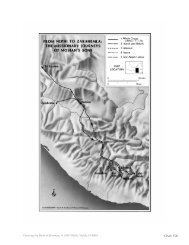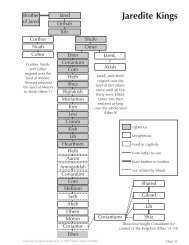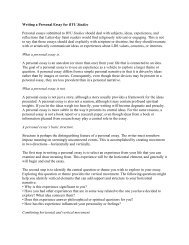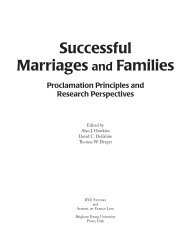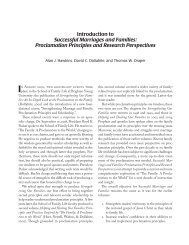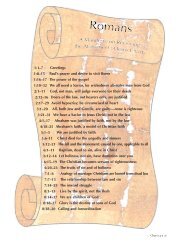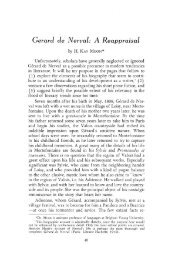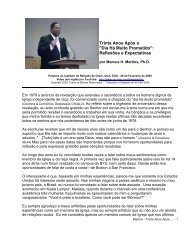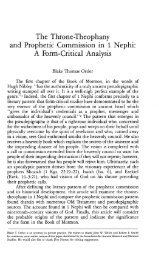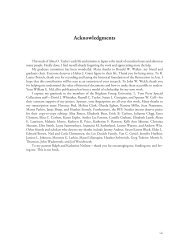Robert J. Matthews and the RLDS Church's Inspired Version of the ...
Robert J. Matthews and the RLDS Church's Inspired Version of the ...
Robert J. Matthews and the RLDS Church's Inspired Version of the ...
You also want an ePaper? Increase the reach of your titles
YUMPU automatically turns print PDFs into web optimized ePapers that Google loves.
104 v BYU Studies<br />
Thus, 1965 was becoming a watershed year in <strong>RLDS</strong> considerations<br />
<strong>of</strong> <strong>the</strong> New Translation. Concerns from those outside <strong>the</strong> administration<br />
(both <strong>RLDS</strong> <strong>and</strong> LDS), <strong>the</strong> Davies report, <strong>and</strong> growing questions<br />
from certain <strong>RLDS</strong> Church administrators worked toge<strong>the</strong>r to move <strong>the</strong><br />
organization forward in new directions. The whole concept <strong>of</strong> hierarchical<br />
revelation to prophets in <strong>the</strong> <strong>RLDS</strong> tradition <strong>and</strong> its binding nature on<br />
o<strong>the</strong>rs was shifting, <strong>and</strong> issues related to <strong>the</strong> <strong>Inspired</strong> <strong>Version</strong> helped fuel<br />
<strong>the</strong> discussion. This concern was explored in a later publication by Howard<br />
when he questioned <strong>the</strong> “doctrine <strong>of</strong> infallibility concerning <strong>the</strong> prophet’s<br />
statements made under inspiration” <strong>and</strong> concluded that <strong>the</strong> “church is<br />
confronted squarely with <strong>the</strong> question <strong>of</strong> <strong>the</strong> human element in revelation<br />
<strong>and</strong> scripture.” 33<br />
In May 1965, President F. Henry Edwards wrote fellow members <strong>of</strong> <strong>the</strong><br />
First Presidency reporting on his thorough review <strong>of</strong> Davies’s work <strong>and</strong><br />
characterizing it as “scholarly <strong>and</strong> helpful.” The report “confronts us with<br />
a necessity for a series <strong>of</strong> decisions,” <strong>and</strong> Edwards suggested three possible<br />
courses <strong>of</strong> action: (1) seek to prevent its publication; (2) begin a proposed<br />
five-year project <strong>of</strong> <strong>of</strong>fering to members findings from <strong>the</strong> report according<br />
to <strong>the</strong> “capacity <strong>of</strong> our people to absorb this information;” or (3) publish <strong>the</strong><br />
study as is. 34<br />
Edwards felt <strong>the</strong> most responsible <strong>of</strong> <strong>the</strong>se choices was to pursue <strong>the</strong><br />
second course. He went on to suggest revisions to <strong>the</strong> preface material in<br />
future editions <strong>of</strong> <strong>the</strong> <strong>Inspired</strong> <strong>Version</strong>. Davies’s report highlighted certain<br />
issues relative to <strong>the</strong> nature <strong>of</strong> that work <strong>and</strong> to <strong>the</strong> Church’s historical presentation<br />
<strong>of</strong> it, <strong>and</strong> Edwards recognized that <strong>the</strong> Church’s posture regarding<br />
it might have to undergo significant revision. Such revisionism included<br />
“our attitude toward <strong>the</strong> o<strong>the</strong>r revelatory work <strong>of</strong> Joseph.” 35<br />
During this period in his newly assumed role as acting historian,<br />
Howard turned his attention to <strong>the</strong> ongoing turmoil created by continued<br />
requests for access to <strong>the</strong> New Translation manuscripts. In September he<br />
wrote to <strong>the</strong> First Presidency, “Pursuant to my conversation with President<br />
Smith yesterday I am addressing to <strong>the</strong> First Presidency a document setting<br />
33. Richard P. Howard, “Latter Day Saint Scriptures <strong>and</strong> <strong>the</strong> Doctrine <strong>of</strong> Propositional<br />
Revelation,” Courage: A Journal <strong>of</strong> History, Thought <strong>and</strong> Action 1, no. 4 (June<br />
1971): 219, 224. In <strong>the</strong> article, he also stated that in light <strong>of</strong> pr<strong>of</strong>essionalism in <strong>the</strong><br />
fields <strong>of</strong> history, <strong>the</strong>ology, <strong>and</strong> philosophy, “what is now needed, among both leaders<br />
<strong>and</strong> members, is a serious reevaluation <strong>of</strong> both <strong>the</strong> content <strong>and</strong> character <strong>of</strong> LDS<br />
revelation <strong>and</strong> scriptures” (210).<br />
34. F. Henry Edwards to W. Wallace Smith <strong>and</strong> Maurice L. Draper, May 25,<br />
1965.<br />
35. Edwards to Smith <strong>and</strong> Draper, May 25, 1965.



